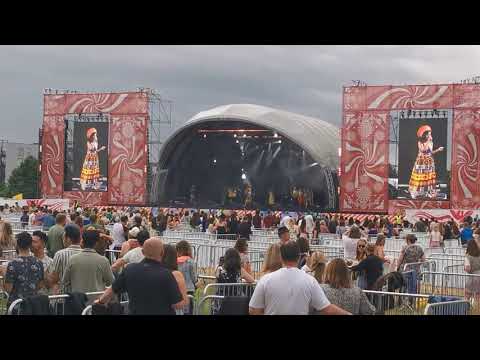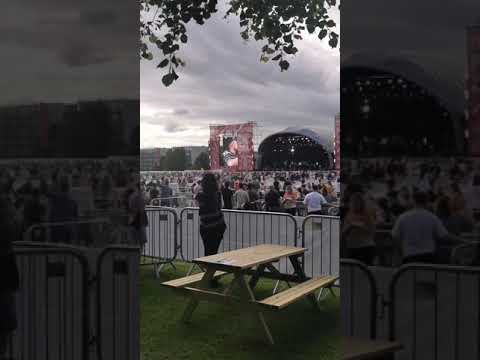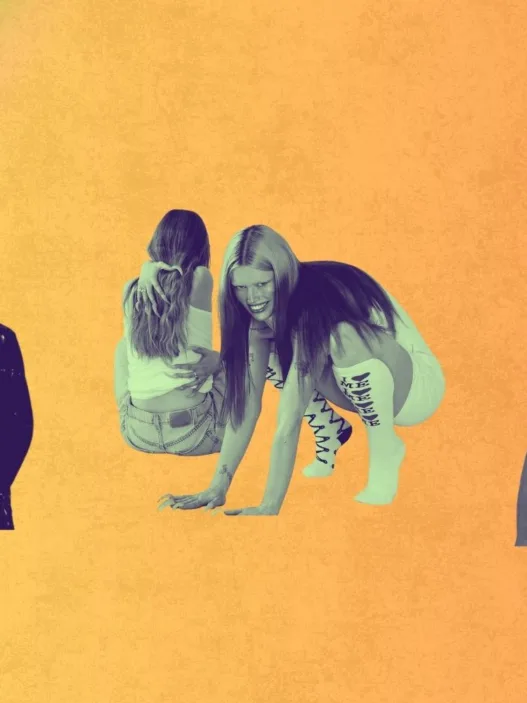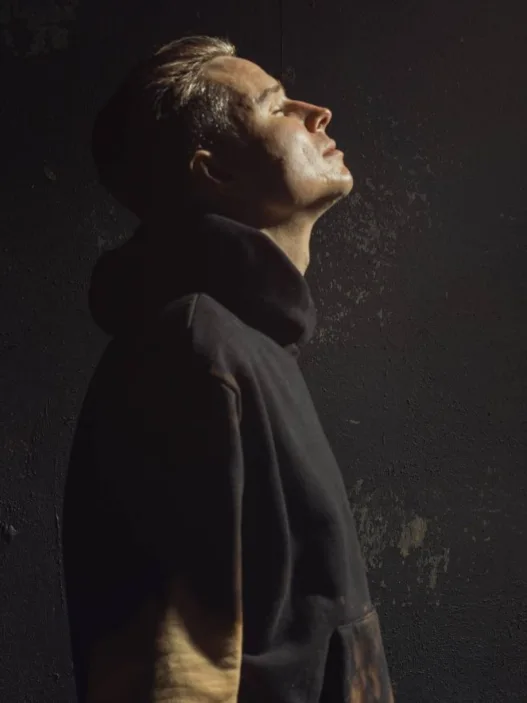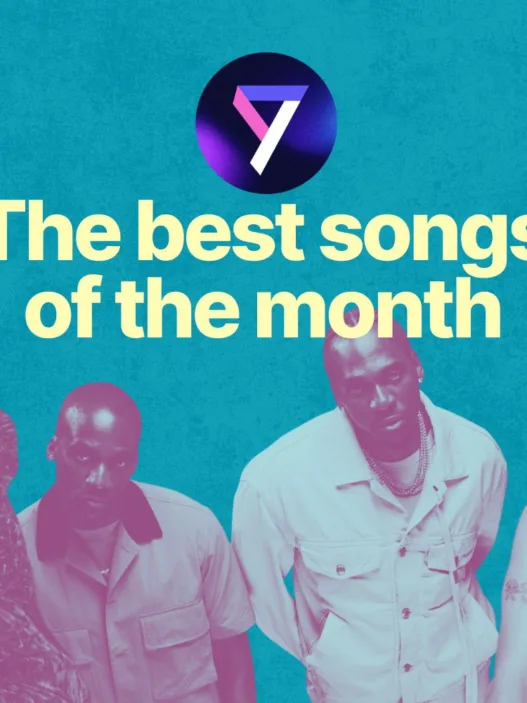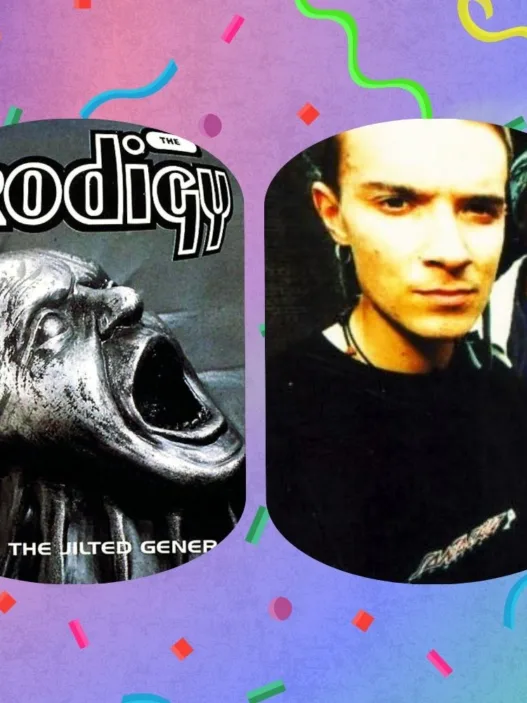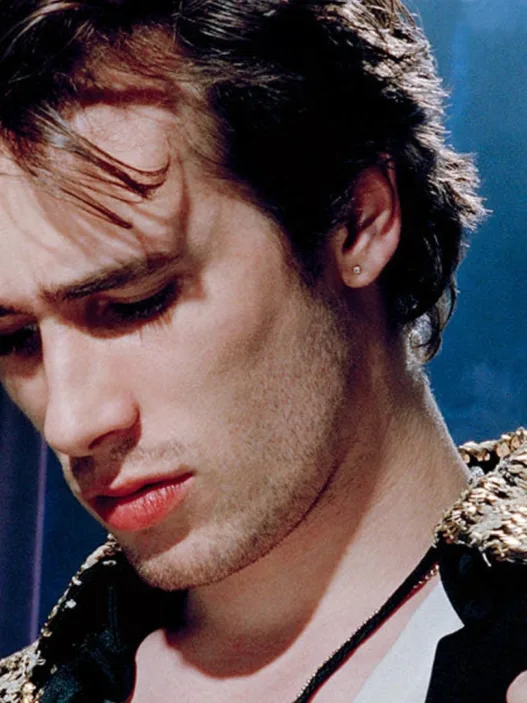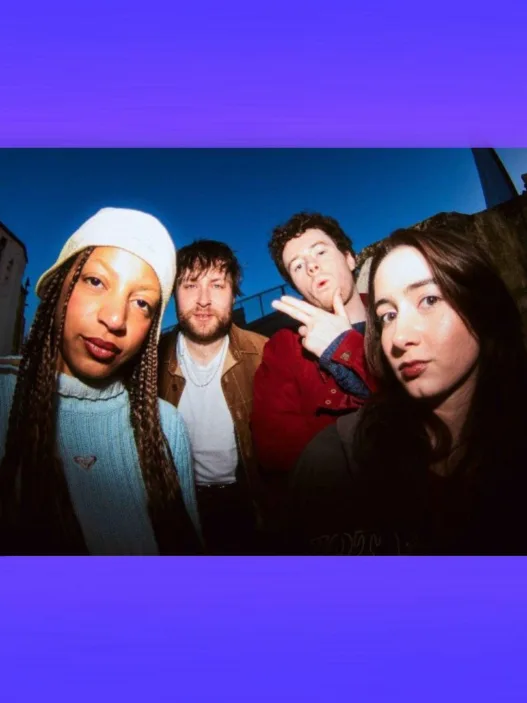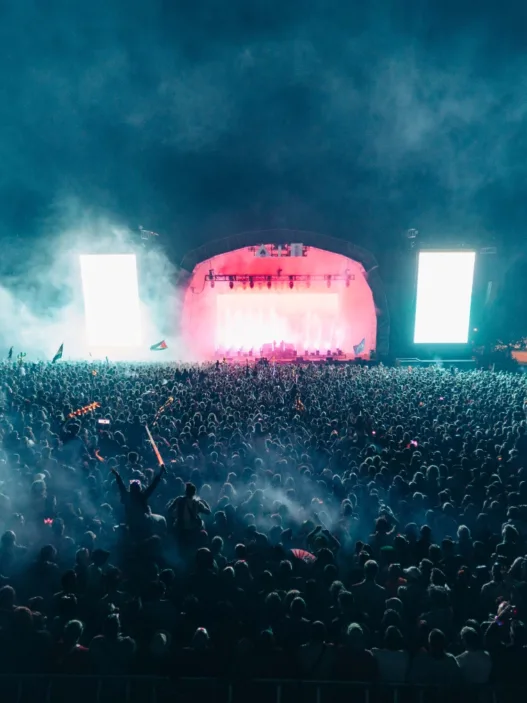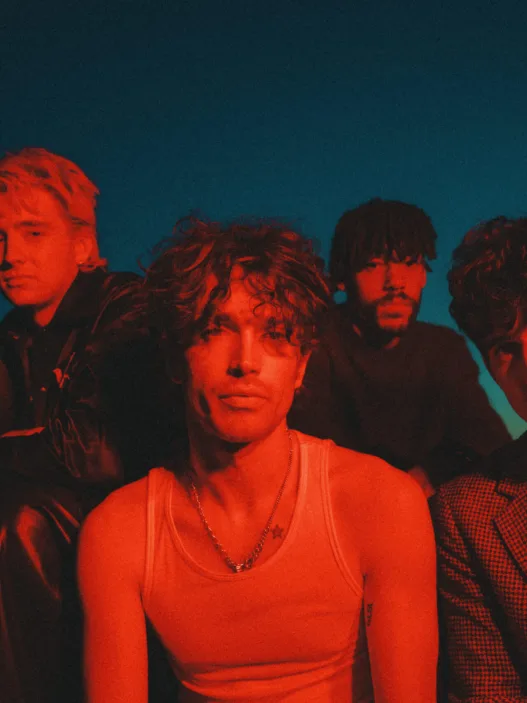On Saturday, for the first time in 15 months, 3500 people attended a day long music festival at the Royal Hospital Kilmainham in Dublin.
The event, dubbed simply Pilot Festival featured music from Gavin James, Lyra, Denise Chaila, Sharon Shannon, Wild Youth and Wyvern Lingo, who played to an outdoor audience separated into barrier-blocked pods of 4 to 6 separated by 1 metre social distancing between them.
Every attendee had to get a negative antigen test at Collin’s Barracks in advance of the gig so that they could enter. Proof of a negative test was denoted by a green wristband with “Antigen Tested” written on it.
Mask-wearing was mandatory when moving outside of pods and to use the facilities – the bar, food concessions and toilets.
I attended the event on Saturday as media as I was interested in what it would be like, having attended the much-smaller Iveagh Gardens James Vincent McMorrow gig in June (our podcast on it is here), which received a lot of backlash from people about the lack of testing.
So let’s start with my experience of the day before we get to the talk about the FUTURE OF GIGS.
So what was the Pilot Festival like?
It was a combination of a lot of things. It was a weird thing that felt unnatural to a regular gig going experience, especially early on in the day when the pods were largely empty and due to being spread out and blocked by barriers, just really looked odd and not conducive to a good atmosphere.
Here’s a picture from the day before the event:

With everyone being spread out, and not allowed to move around, the pockets of atmosphere that you’d feel when people gathered at a festival, were not palpable unless you were close to people dancing. It was tough for the acts on early in this environment, and I felt Denise Chaila, who a lot of people told me they were there to see – lifted the crowd 3 hours after the gates opened, and an hour after the bar opened, which also naturally, helped people enjoy the very odd experience.
As the day went on, and the pods filled up and the bars opened, the atmosphere became more familiar and like an actual festival, but it was not something I’d want to experience repeatedly.
For the record, as a media attendant, I was put alongside media at individually numbered picnic tables at the back of the arena, in pods of 4. Media were given a media vest and a lanyard, the former which was a first for me at a music event of any kind.
Picnic tables were set up at the front, which I think were largely for guestlist and VIPs, not that I could go and check personally from the back.
Here’s what the arena looked like before Gavin James went on, at around 9pm.

The 2 Johnnies MC’d the event in order to bring some sort of everyman levity and songs to proceedings, and while it is not my preferred type of humour, the parts in between acts where they did a dance cam with audience interaction really helped loosen things up, and made it feel less weird.
The Pilot Festival is what happens when a government dictate a music festival
By now, you have probably seen Dave Hanratty’s tweeted picture of the message the screens displayed to attendees during the day.
xLol pic.twitter.com/iERcDmpuQv
— Dave Hanratty (@HanrattyDave) July 3, 2021
The heavy-handed “how do you do, fellow kids” message was indicative of how the government had the final say at this event.
The event was an approved gig organised by MCD on behalf of the government and the Department of Tourism, Culture, Arts, Gaeltacht, Sport and Media.
Is this the future of gigs?
No. You can say events like Saturdays are lame, embarrassing , farcical and not representative of reality and you’d be absolutely right.
But, the experience of an event can be both farcical and hopeful at once. Social media discourse suggests how you feel about something is a binary thing – good OR bad – but it can be both, at once. There is room for nuance, competing feelings that sit together uncomfortably.
A prevalent idea that invariably pops up on social media replies is that these events are a grim vision of an Orwellian dystopian gig future, in which all large-scale gigs will have to be government-approved and run with social distancing, pods, advance testing and we are all herded like cattle into pens in the pursuit of live music entertainment for the rest of our lives.
Do people really believe that’s what is happening here? Do you think promoters WANT this? Bands WANT this? Do you think ANYONE WANTS THIS? There’s a lot of conspiracy rubbish around COVID but gigs are not going to be like this from now on, these are stopgap events to allow some factions of the industry to do what they do. These test or pilot events have no long term future, but they could help us. More on that later.
Pilot gigs are misnomered as they aren’t really piloting or testing much other than allowing events to be run in a social environment while vaccinations are being rolled out across the age groups of the country.
What did the testing achieve?
It was welcome that antigen testing was a part of the event, and data has shown that only 1 person was tested positive (but later negative) in advance of the gig.
So, the larger question is why even do the testing if there’s going to be an insistence that everyone is divided into pods with social distancing measures? Would it not make more sense to test beforehand, allow people who tested negative to mingle without social distancing (like we’ve seen months ago in places like Barcelona and Liverpool) and then test afterwards so there’s actual usable data?
Will the other pilot events build on this in any way? The next pilot event is an indoor gig in the Roisin Dubh in Galway this Saturday, and will feature tables of 2 to 6 with a maximum of 80 people for an Iarla Ó Lionáird & Steve Cooney show, while the plans for an indoor pilot nightclub event to come simply cannot include social distancing.
The arguments around the validity of antigen testing coming from NPHET in recent weeks, while the rest of Europe has adopted antigen testing as a way forward, has further put Ireland behind the rest of Europe in terms of re-opening. This is deeply frustrating.
Ireland has already had the most punitive measures in place in Europe, and people are rightly sickened with just how little vision the government have shown about the future, and these gigs are a part of that, when we’ve seen 5000 capacity events and up happen in countries elsewhere with no social distancing or masks.
There’s no definitive way to say that one country is doing things to the right way across the board, especially with the Delta variant in the mix.
What about the Delta variant?
The rise of the Delta variant, being 60% more transmissible, has also made decision-making more conservative here, even though data suggests that COVID-19 vaccines still offer protection, especially for the double vaccinated.
A study based on real-world data from the U.K. found that two doses of the Pfizer vaccine were 88% effective at preventing COVID-19 as a result of an infection with the Delta variant. That’s just a notch down from the 95% efficacy it demonstrated in clinical trials against earlier, less transmissible strains.
However, for those who’ve had just a single dose of vaccines made by either Pfizer or AstraZeneca, the effectiveness against the Delta variant was only 33%, the U.K. researchers found. The effectiveness of one dose of those vaccines against earlier strains had been 51%.
As more and more of the country get vaccinated over the July and August, there should be less focus on lockdowns and more focus on living with the variants, and adapting to having gigs, indoor dining, live theatre and culture, hospitality and nightclubs sooner rather than later. How we do that is the next big question for the government and the live events industry.
Is it not just performative PR so the government can say they are doing something?
Sure, there is absolutely a performative and PR aspect to these events allowed by the government. You also can’t put the blame on bands and promoters for being involved in them. Many are desperate to perform and do what they do.
NO-ONE WANTS THIS TO BE THE FUTURE OF LIVE MUSIC.
Socially-distant, reduced cap events aren’t financially viable for promoters for more than one government-financed live event at a time. They are not the future.
The music industry is desperate to return to a live music scene that doesn’t feature pods, barriers and social distancing, and many see these pilot events as a necessary hoop jump to get to their goal of convincing our conservative government to allowing normality to take place before the end of the year – which includes acoustic performers in pubs, DJs in bars and music at weddings along with all venues great and small.
What next?
As the industry waits to see what level of restrictions we will be at by September onwards in Ireland, MCD are actively sending out press releases highlighting how much other countries are ahead of us in terms of events, citing progression like the Foo Fighters at Madison Square Garden, the UK adopting a postponed “live with COVID” approach from July 19th, which will involve easing of restrictions and face masks becoming optional, while Northern Ireland is about to remove its cap of 500 people at a gig outdoors.
Of course, the biggest promoter in Ireland is going to be on the side of opening up the live events industry, they will naturally speak up for the re-opening of their industry. It’s why they facilitated Saturday’s gig.
Smaller indoor events and outdoor events will take place, but the big marker is the removal of social distancing and masks. So, how do we get there? It’s not an easy answer but it is possible.
While clubbing is back in places like Amsterdam, with the provision that people show a digital COVID status certificate, that’s not without its problems too. A report that 180 people have so far tested positive for Covid-19 in the Netherlands after a single club night of 650 people, with the suggestion that forged proof of a negative test or a vaccination to enter were part of the attendance, signifies the issues we have as we go forward.
In Denmark, in order to go to indoor spaces, football stadiums and concerts, a resident has to show either – a negative test result within the last 72 hours, infection from coronavirus from 2 to 12 weeks previously, or proof of vaccination. That info is stored the “coronapas” app, and can be presented when required.
Similarly, the use of blockchain technology is being used as a method for a vaccination pass in international travel, and could be applied to events and hospitality.
Meanwhile, studies suggest the effectiveness of proper ventilation indoors, yet that doesn’t seem to be a part of the re-opening discourse here. While in Belgium, CO2 monitors are mandatory in all indoor venues, so customers can see whether the space is adequately ventilated.
But, I believe that as the vaccination rollout gets down to the ages of 18 to 34, the proven efficacy of the vaccines against the Delta variant, and the use, however disputed, of rapid antigen testing in advance of events and the employment of a digital and fully-verifiable “vaccine passport” cert (that can’t be faked) or equivalent that allows entry, is the only way forward for us now.
I can’t tell the world I had a great time on Saturday (#pilotevent) as per the government’s screen request, but I want to have a great time in future, and that can only mean a return to pre-pandemic “normal” gigs without restrictions, with public health and safety factored in.
The pilot events can, if approached holistically, with useful data taken before and after, informing a larger goal, help us return to a gig reality we can all agree is one we want to participate in.

Niall Byrne is the founder of the most-influential Irish music site Nialler9, where he has been writing about music since 2005 . He is the co-host of the Nialler9 Podcast and has written for the Irish Times, Irish Independent, Cara Magazine, Sunday Times, Totally Dublin, Red Bull and more. Niall is a DJ, founder of Lumo Club, club promoter, event curator and producer of gigs, listening parties & events in Dublin.


